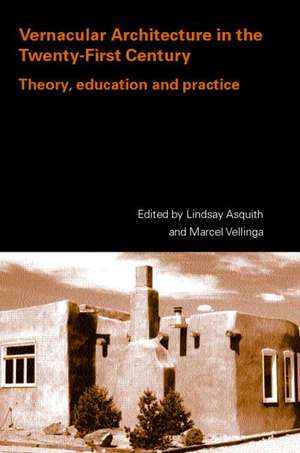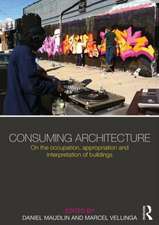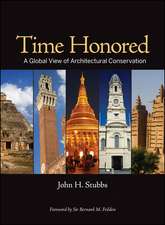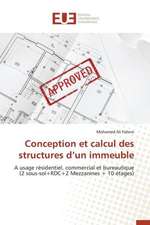Vernacular Architecture in the 21st Century: Theory, Education and Practice
Editat de Lindsay Asquith, Marcel Vellingaen Limba Engleză Paperback – 13 dec 2005
| Toate formatele și edițiile | Preț | Express |
|---|---|---|
| Paperback (1) | 454.81 lei 6-8 săpt. | |
| Taylor & Francis – 13 dec 2005 | 454.81 lei 6-8 săpt. | |
| Hardback (1) | 1290.19 lei 6-8 săpt. | |
| Taylor & Francis – 13 dec 2005 | 1290.19 lei 6-8 săpt. |
Preț: 454.81 lei
Nou
Puncte Express: 682
Preț estimativ în valută:
87.02€ • 90.87$ • 71.86£
87.02€ • 90.87$ • 71.86£
Carte tipărită la comandă
Livrare economică 15-29 aprilie
Preluare comenzi: 021 569.72.76
Specificații
ISBN-13: 9780415357951
ISBN-10: 0415357950
Pagini: 312
Ilustrații: 4 tables, 44 halftones and 25 line drawings
Dimensiuni: 156 x 234 x 14 mm
Greutate: 0.58 kg
Ediția:New.
Editura: Taylor & Francis
Colecția Taylor & Francis
Locul publicării:Oxford, United Kingdom
ISBN-10: 0415357950
Pagini: 312
Ilustrații: 4 tables, 44 halftones and 25 line drawings
Dimensiuni: 156 x 234 x 14 mm
Greutate: 0.58 kg
Ediția:New.
Editura: Taylor & Francis
Colecția Taylor & Francis
Locul publicării:Oxford, United Kingdom
Public țintă
Postgraduate, Professional, and UndergraduateCuprins
Foreword Nezar AlSayyad Introduction Part 1: The Vernacular as Process 1. Building Tradition: Control and Authority in Vernacular Architecture 2. Endorsing Indigenous Knowledge: The Role of Masons and Apprenticeship in Sustaining Vernacular Architecture – The Case of Djenne 3. Forms and Meanings of Mobility: The Dwellings and Settlements of Sedentarised Irish Travellers 4. Engaging the Future: Vernacular Architecture Studies in the Twenty-First Century Part 2: Learning from the Vernacular 5. Traditionalism and Vernacular Architecture in the Twenty-First Century 6. Learning from the Vernacular: Basic Principles for Sustaining Human Habitats 7. Lessons from the Vernacular: Integrated Approaches and New Methods for Housing Research 8. Sheltering from Extreme Hazards 9. A Journey through Space: Cultural Diversity in Urban Planning Part 3: Understanding the Vernacular 10. Vernacular Design as a Model System 11. 'Generative Concepts' in Vernacular Architecture 12. The Future of the Vernacular: Towards New Methodologies for the Understanding and Optimisation of the Performance of Vernacular Buildings 13. Architectural Education and Vernacular Building 14. Educating Architects to become Culturally Sensitive
Notă biografică
Lindsay Asquith worked with Paul Oliver on the compilation of the Encyclopedia of Vernacular Architecture of the World (1997) and subsequently as a Research Associate in the Department of Architecture at Oxford Brookes University. She completed her PhD in 2003 and now works as an Architectural Design Consultant in the housing sector.
Marcel Vellinga is a Research Fellow in the Department of Architecture at Oxford Brookes University, England. He is the author of Constituting Unity and Difference: Vernacular Architecture in a Minangkabau Village (2004) and of various articles dealing with the anthropology of architecture in Indonesia. He is currently co-editing, with Paul Oliver, the Atlas of Vernacular Architecture of the World.
Marcel Vellinga is a Research Fellow in the Department of Architecture at Oxford Brookes University, England. He is the author of Constituting Unity and Difference: Vernacular Architecture in a Minangkabau Village (2004) and of various articles dealing with the anthropology of architecture in Indonesia. He is currently co-editing, with Paul Oliver, the Atlas of Vernacular Architecture of the World.
Recenzii
'A book with a mission ... the editor's pool of contributers include some of the most prominent writers ... It is both an edited collection of analytical essays and a rallying cry for vernacular architectural studies.' - The Journal of Architecture
'The numerous diverse opinions set out in this volume give the reader an excellent survey of the advantages and the problems of vernacular architecture, and the empoyment of good vernacular practice could evidently be a big help to construction in developing countries.' – Architectural Science Review
'The numerous diverse opinions set out in this volume give the reader an excellent survey of the advantages and the problems of vernacular architecture, and the empoyment of good vernacular practice could evidently be a big help to construction in developing countries.' – Architectural Science Review
Descriere
These essays from leading experts in the field focus on theory, education and practice in this essential sector of architecture, and help to formulate solutions to the challenges facing the global community today.






